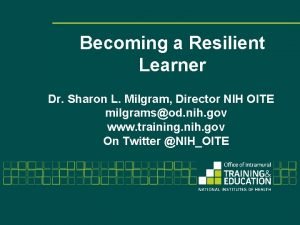Building Resilient and Sustainable Systems for Health RSSH

Building Resilient and Sustainable Systems for Health (RSSH)

Important terminology Resilient and Sustainable Systems for Health (RSSH) “are the systems that can respond to emerging epidemics as well as providing basic health services to ensure prosperous and stable communities and nations. Building such systems will be the foundation for countries to achieve universal health coverage in the era of Sustainable Development Goals and health security in an ever more mobile and interconnected world. ” “Systems for health, differently from health systems, do not stop at a clinical facility but run deep into communities and can reach those who do not always go to health clinics, particularly the vulnerable and the marginalized. To reach “the last mile”, systems for health focus on people, not issues and diseases. Systems for health involving the community will always be the first to identify report and respond to emergency health threats. ’’ The Global Fund, 2015. www. theglobalfund. org/en/healthsystems 1

The Global Fund 2017 -2022 strategy Global Fund Strategy 2017 -2022 1 2 Maximize impact against HIV, TB and malaria Build resilient and sustainable systems for health 3 Promote and protect human rights and gender equality 4 Mobilize increased resources 2 To ensure that people have access to effective, efficient, and accessible services through well-functioning and responsive health and community systems Strengthening systems for health is critical to attain universal health coverage and to accelerate the end of the epidemics: a) Strengthen community responses and systems b) Support reproductive, women’s, children’s, and adolescent health (RMNCAH), and platforms for integrated service delivery c) Strengthen global and in-country procurement and supply chain systems d) Leverage critical investments in human resources for health e) Strengthen data systems for health and countries’ capacities for analysis and use f) Strengthen and align to robust national health strategies and national disease-specific strategic plans g) Strengthen financial management and oversight 2

Seven RSSH sub-objectives a) Strengthening community responses and systems • Community-led service delivery, monitoring and advocacy for social accountability, capacity building and social mobilization • Use disease modules for planning community-led service delivery that is disease-specific, and RSSH-Community Systems Strengthening module for cross-cutting community systems strengthening, as relevant b) Support reproductive, maternal, newborn, child and adolescent health (RMNCAH) and platforms for integrated service delivery • Inclusion of HIV, TB and malaria services into integrated platforms (antenatal care, integrated community case management, HIV-sexual and reproductive health, adolescents) • Includes developing supportive policy environments; strengthening service organization & management; service delivery infrastructure, including labs c) Strengthen global and in-country procurement and supply chain systems • Strengthen design and implementation through better national regulatory and policy environment, workforce, monitoring systems, infrastructure and tools d) Leverage critical investments in human resources for health (HRH) • HRH policies, workforce planning/management; education and training; remuneration; retention and motivation 3

Seven RSSH sub-objectives, continued e) Strengthen data systems for health and countries’ capacities for analysis and use • Routine information systems; program and data quality; data analysis, review and use; surveys and studies; administration and financing of data systems; vital registration systems f) Strengthen and align to robust national health strategies and national disease-specific strategic plans • Interventions that support national strategic plans and promote alignment with disease-specific plans • Support for integrated planning, programming, budgeting and financing for health and disease control programs g) Strengthen financial management and oversight • Public financial management strengthening; routine financial management improvement For more information, please read the RSSH Information note, and supporting technical briefs, soon to be posted on the Global Fund website 4

Overview: preparing funding requests for RSSH Country Dialogue Ensure an inclusive approach to country dialogue Agree on amount for RSSH, modalities and timeline for request Submit a funding request to the Global Fund Secretariat Develop funding request 5

Inclusive country dialogue and program split Inclusive country dialogue • Using an inclusive process, countries are strongly encouraged to discuss RSSH upfront, and develop a comprehensive approach, ensuring that it covers the needs of all eligible diseases • Relevant RSSH groups should be involved in these discussions with the Country Coordinating Mechanism • This includes civil society and community health advocates, and representatives/advocates for key and vulnerable populations Agree on amount for RSSH • Countries are informed of their overall allocation, and an indicative amount for each eligible disease component (i. e. program split) in an Allocation Letter • Applicants use a documented and inclusive process to confirm or revise the program split for the three diseases • Funding for RSSH should be earmarked from the overall allocation, but does not need to be noted in the program split unless a standalone RSSH funding request will be submitted 6

Application approaches for RSSH Agree on application approach and timeframe • Countries are requested to apply for RSSH in first application • Can be together with a disease application • Or can be a separate RSSH application (there is no RSSH application template; use normal forms) • Countries encouraged, where possible, to submit integrated funding requests (consisting of HIV, TB, malaria and RSSH programs), or simultaneous submissions of individual funding requests to ensure coherence. Prepare funding request • Requests should be based on sub-sector plans (e. g. RMNCAH, Human Resources for Health (HRH), Procurement and Supply Management (PSM), Health Management Information Systems (HMIS), Integrated Laboratory Services, Public Financial Management (PFM) • Conduct needs assessment/gap analysis if needed. 7

CCM and Technical Partners’ Role in RSSH Requests CCMs • Initiate and facilitate inclusive country dialogue • Bring RSSH and disease-specific stakeholders together to coordinate and plan • Identify the need for, and request technical support • Determine timing and modality of request (ensure new grants signed before old grants expire) • Ensure inclusion of civil society and community representatives. Technical Partners • Ensure RSSH actors involved in CCM discussions • Raise RSSH issues during country dialogue to address system-wide weaknesses • Ensure RSSH requests are strategic, and based on normative guidance • Provide support for participation of civil society and community representatives • Provide technical support upon request. 8

RSSH Tools and Guidance Material and Tools • RSSH information note • Technical briefs on: • Strengthening Community Systems and Responses • Strengthening RMNCAH • Strategic Support for Human Resources for Health • Strategic Support for Integrated Laboratory Services • Modular matrix guide Training Packages • RSSH for CCMs • RSSH overview for external stakeholders 9

Partnerships in RSSH Technical partners ü WHO – Reproductive, maternal, newborn, child and adolescent interventions (RMNCAH), Health Management Information Systems (HMIS), Procurement and Supply Management (PSM), national strategies, health financing ü UNICEF – Integrated services, supply chains, district strengthening ü UNFPA – RMNCAH and integrated services ü The World Bank – Universal health coverage, result-based financing; health financing; domestic resource mobilization Technical support providers ü GIZ BACKUP Health ü Expertise France ü USG 5% initiative ü Global Fund Community, Rights and Gender Technical Assistance http: //www. theglobalfund. org/en/fundingmodel/technicalcooperation/communityrightsgender/ Other supportive partnerships ü IHP for UHC 2030 ü Global Health Workforce Network ü Health Data Collaborative 10
- Slides: 11





















